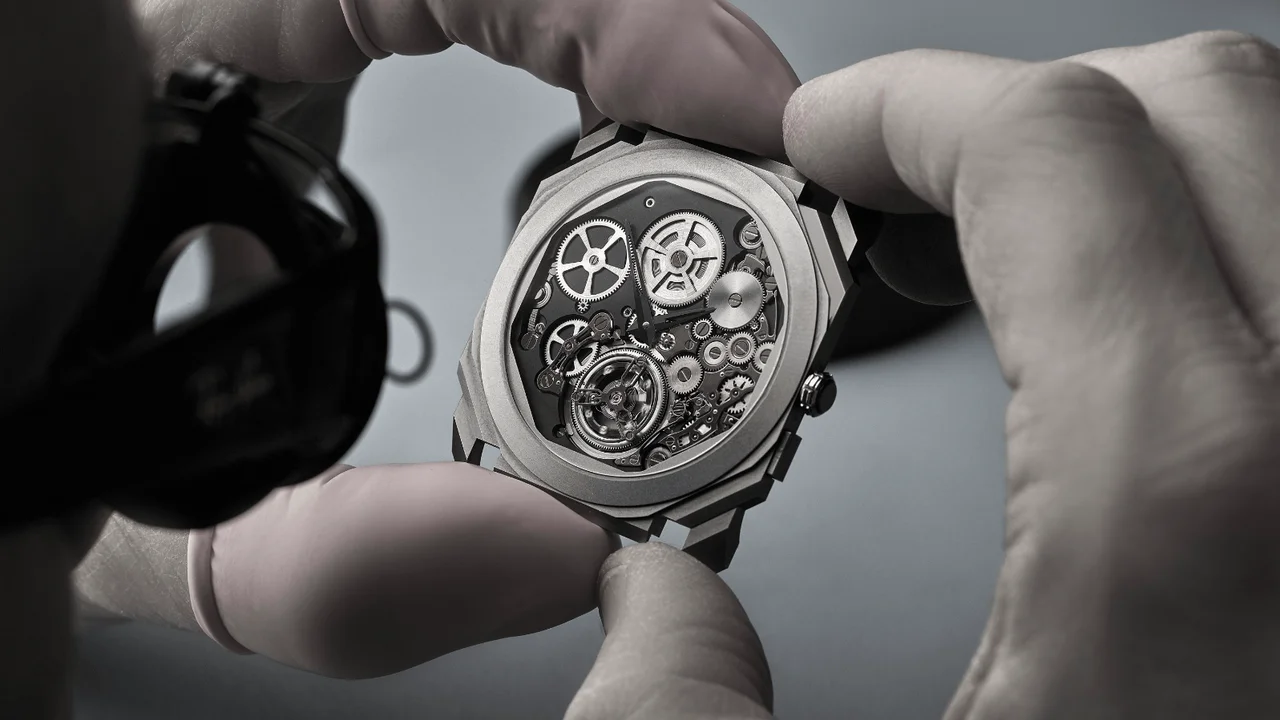The Ultimate Guide to Luxury Watch Movements: Mechanical vs
Learn about the differences between mechanical and quartz movements in luxury watches. Understand the craftsmanship and technology behind each type.

Luxury Watch Movements: A Deep Dive into Mechanical Movements
Okay, let’s get into the heart of a luxury watch: the movement. A mechanical movement is like the soul of the watch. It’s powered by a mainspring that you wind (either manually or automatically through your own movement!), which then slowly unwinds, turning gears and levers to keep time. No batteries here! It’s all about intricate engineering and craftsmanship.
Mechanical movements are often prized for their complexity and the skill required to assemble them. Watchmakers spend years perfecting their craft, and the best mechanical movements are true works of art. You can often see these beautiful movements through a transparent case back, which is a real treat for watch enthusiasts.
Types of Mechanical Movements
There are two main types of mechanical movements:
* **Manual-winding:** You have to wind these watches every day (or every other day, depending on the power reserve) to keep them running. Some people find this ritual very satisfying.
* **Automatic (self-winding):** These watches wind themselves using a rotor that spins as you move your wrist. They’re super convenient because you don’t have to remember to wind them, as long as you wear them regularly.
Pros of Mechanical Movements
* **Craftsmanship:** They’re made with incredible attention to detail and skill.
* **Longevity:** With proper care and maintenance, a mechanical watch can last for generations.
* **No battery required:** You’re not reliant on batteries, which is a plus for sustainability and convenience.
* **Aesthetic appeal:** Many people find the intricate workings of a mechanical movement beautiful and fascinating.
* **Value Retention:** High-end mechanical watches often hold their value, and some even appreciate over time, making them a potential investment.
Cons of Mechanical Movements
* **Accuracy:** Mechanical watches are generally less accurate than quartz watches. They can gain or lose a few seconds per day.
* **Maintenance:** They require regular servicing (every 5-7 years) to keep them running smoothly.
* **Cost:** Mechanical watches are typically more expensive than quartz watches due to the complexity of their movements.
* **Sensitivity:** They can be sensitive to shocks and magnetic fields.
Exploring Quartz Movements in Luxury Timepieces
Now, let's switch gears to quartz movements. Quartz watches are powered by a battery that sends an electrical current through a quartz crystal. This crystal vibrates at a very precise frequency, which is used to keep time. It's a much simpler and more efficient system than a mechanical movement.
While some might think quartz movements are less prestigious, they have their own advantages. They are incredibly accurate, reliable, and require very little maintenance. Plus, advancements in technology have allowed luxury brands to incorporate quartz movements into some stunning designs.
Pros of Quartz Movements
* **Accuracy:** Quartz watches are extremely accurate, typically losing or gaining only a few seconds per month.
* **Low maintenance:** They require very little maintenance other than occasional battery changes.
* **Durability:** Quartz movements are generally more durable and resistant to shocks than mechanical movements.
* **Cost:** Quartz watches are usually more affordable than mechanical watches.
* **Thinness:** Quartz movements can be made very thin, allowing for slimmer watch designs.
Cons of Quartz Movements
* **Battery dependence:** They require batteries, which need to be replaced every few years.
* **Less craftsmanship:** Some people see quartz movements as less impressive from a craftsmanship perspective.
* **Perceived value:** Quartz watches may not hold their value as well as mechanical watches, although some high-end quartz models are exceptions.
* **Less soul:** Some watch enthusiasts feel that quartz watches lack the 'soul' and character of mechanical watches.
* **Environmental Impact:** The batteries require proper disposal to minimize environmental impact.
Comparing Accuracy: Mechanical vs Quartz Luxury Watches
Let's face it, one of the biggest differences is accuracy. Quartz wins, hands down. A good mechanical watch might gain or lose a few seconds *per day*. A quartz watch? We're talking a few seconds *per month* at most. If precise timekeeping is your top priority, quartz is the way to go.
Cost Breakdown: Price Differences in Luxury Watch Movements
Generally, mechanical watches are pricier. All those tiny, handcrafted parts add up! You're paying for the artistry and the tradition. Quartz watches, being simpler to manufacture, are usually more budget-friendly. However, some high-end quartz watches from prestigious brands can still command a hefty price tag due to the design, materials, and brand reputation.
Maintenance Matters: Servicing Mechanical vs Quartz Watches
Mechanical watches are like classic cars – they need regular servicing. Think cleaning, oiling, and adjusting. This usually needs to happen every 5-7 years and can cost a few hundred dollars (or more for complex movements). Quartz watches? Pop in a new battery every few years, and you're good to go! Much simpler and cheaper to maintain.
Luxury Watch Recommendations: Mechanical Masterpieces
Alright, let's get to some specific recommendations! Here are a few mechanical masterpieces that are worth considering:
* **Rolex Submariner:** An iconic dive watch with a robust automatic movement. Expect to pay around $10,000+. Perfect for the adventurous type or anyone who appreciates timeless design. Great for diving, everyday wear, and impressing your friends.
* **Omega Speedmaster Professional 'Moonwatch':** A legendary chronograph with a manual-winding movement. A true piece of history. Price: $6,000+. Ideal for space enthusiasts, history buffs, and those who love a classic chronograph. Wear it to the office, a casual weekend outing, or even (if you dare) on a space mission.
* **Patek Philippe Calatrava:** The epitome of understated elegance. A manual-winding watch with a beautifully finished movement. A classic dress watch with an elegant design. Price: $25,000+. Best for formal events, business meetings, and those who appreciate timeless style.
* **Audemars Piguet Royal Oak:** A sporty and luxurious watch with an integrated bracelet and an automatic movement. Price: $30,000+. A statement piece for those who want to stand out from the crowd. Wear it to a yacht party, a high-end restaurant, or any occasion where you want to make a bold impression.
Luxury Watch Recommendations: Quartz Champions
Don't underestimate quartz! These watches offer incredible accuracy and reliability:
* **Grand Seiko Quartz:** Grand Seiko takes quartz to a whole new level with their incredibly precise and beautifully finished movements. Price: $2,500+. Perfect for those who demand the highest level of accuracy and craftsmanship. Wear it every day, knowing you have a watch that's both stylish and incredibly precise.
* **TAG Heuer Formula 1:** A sporty and stylish chronograph with a reliable quartz movement. Price: $1,500+. Ideal for those who lead an active lifestyle and want a watch that can keep up. Wear it while working out, playing sports, or just running errands.
* **Cartier Tank:** A classic design with a quartz movement. A timeless and elegant dress watch. Price: $3,000+. Best for formal events, business meetings, and those who appreciate classic style.
Movement Style Comparison: Choosing the Right Luxury Watch for You
So, which is right for you? It really depends on your priorities. If you value accuracy and low maintenance, quartz is the clear winner. If you appreciate craftsmanship, tradition, and the artistry of watchmaking, mechanical is the way to go. Consider your budget, your lifestyle, and your personal preferences. Do you want a watch that's a conversation starter and a piece of art? Or do you want something that's reliable, accurate, and requires minimal fuss? The choice is yours!
:max_bytes(150000):strip_icc()/277019-baked-pork-chops-with-cream-of-mushroom-soup-DDMFS-beauty-4x3-BG-7505-5762b731cf30447d9cbbbbbf387beafa.jpg)





